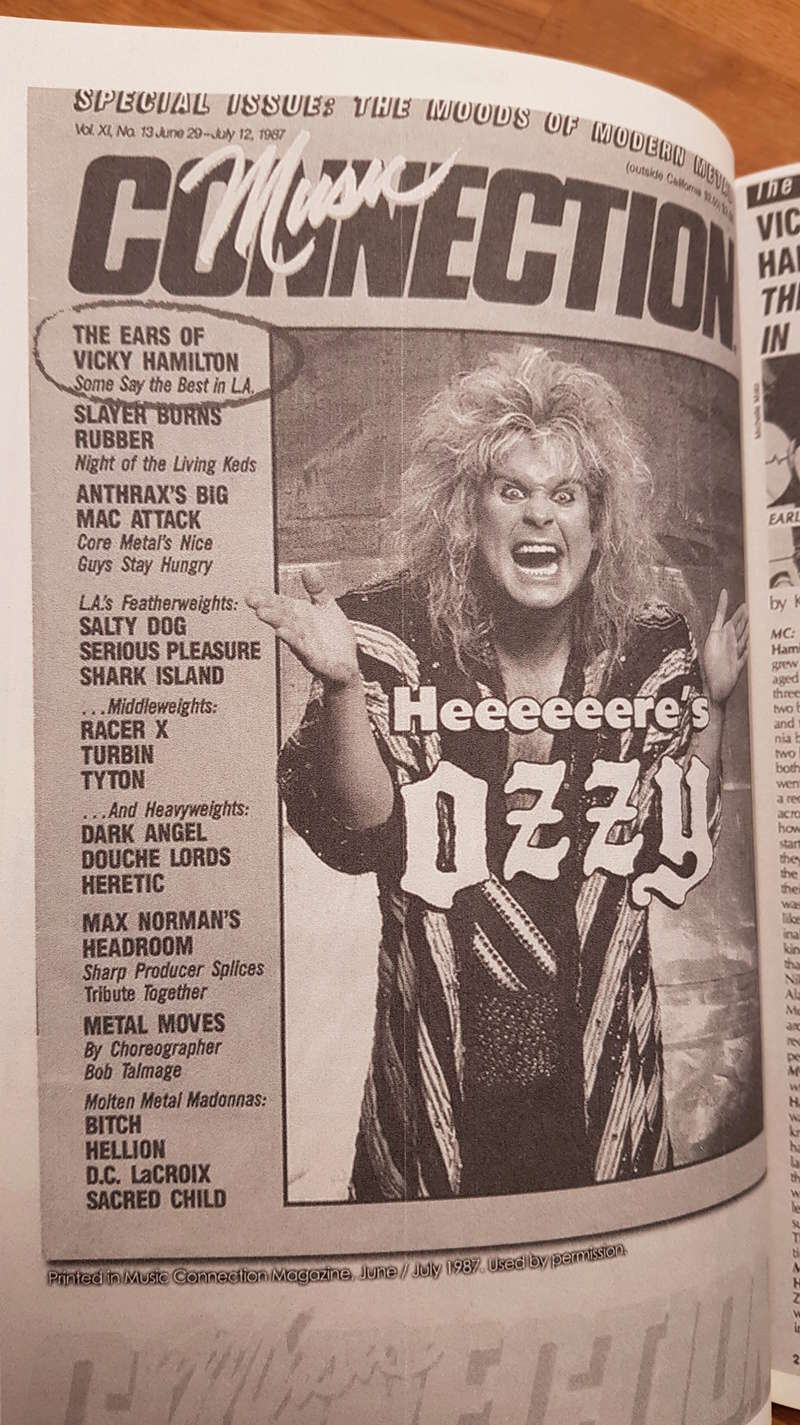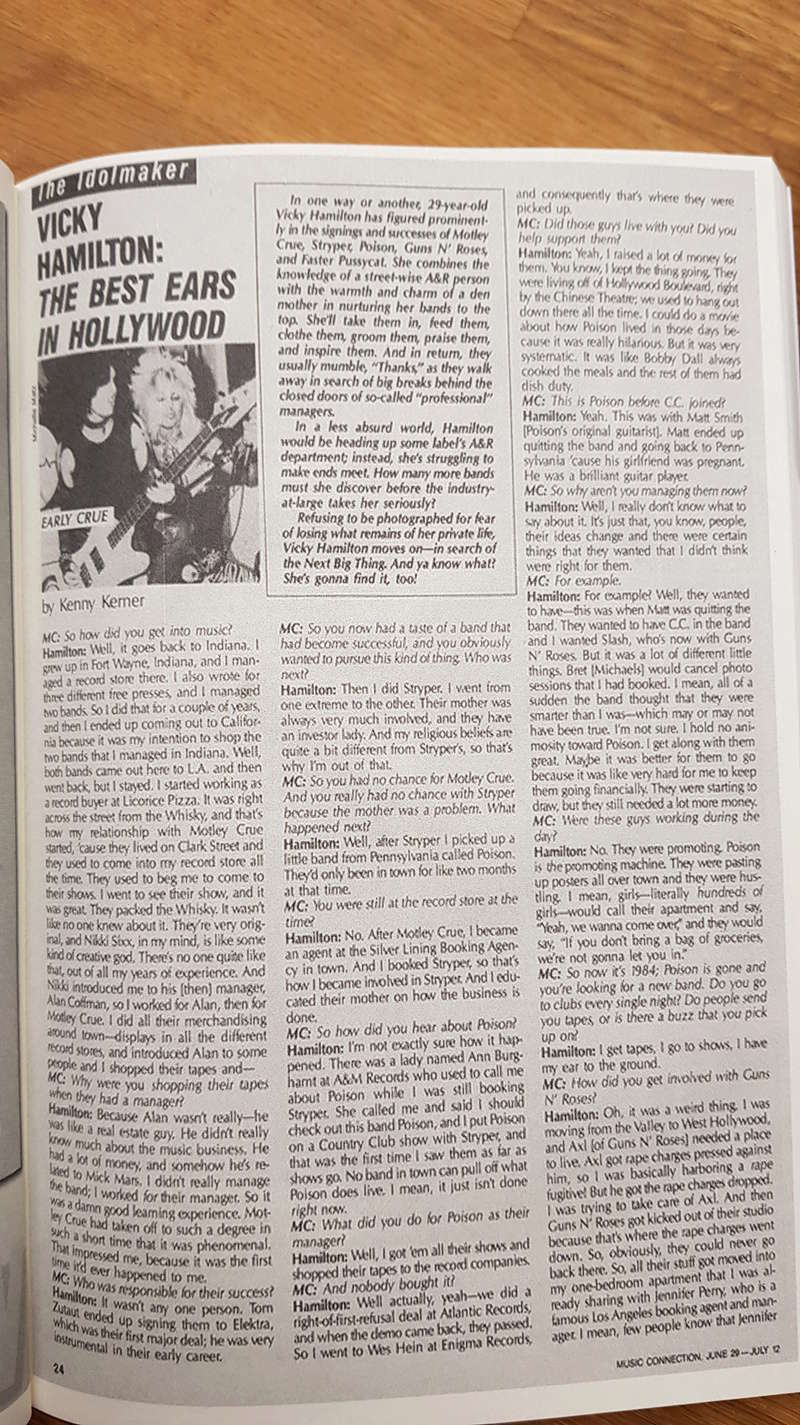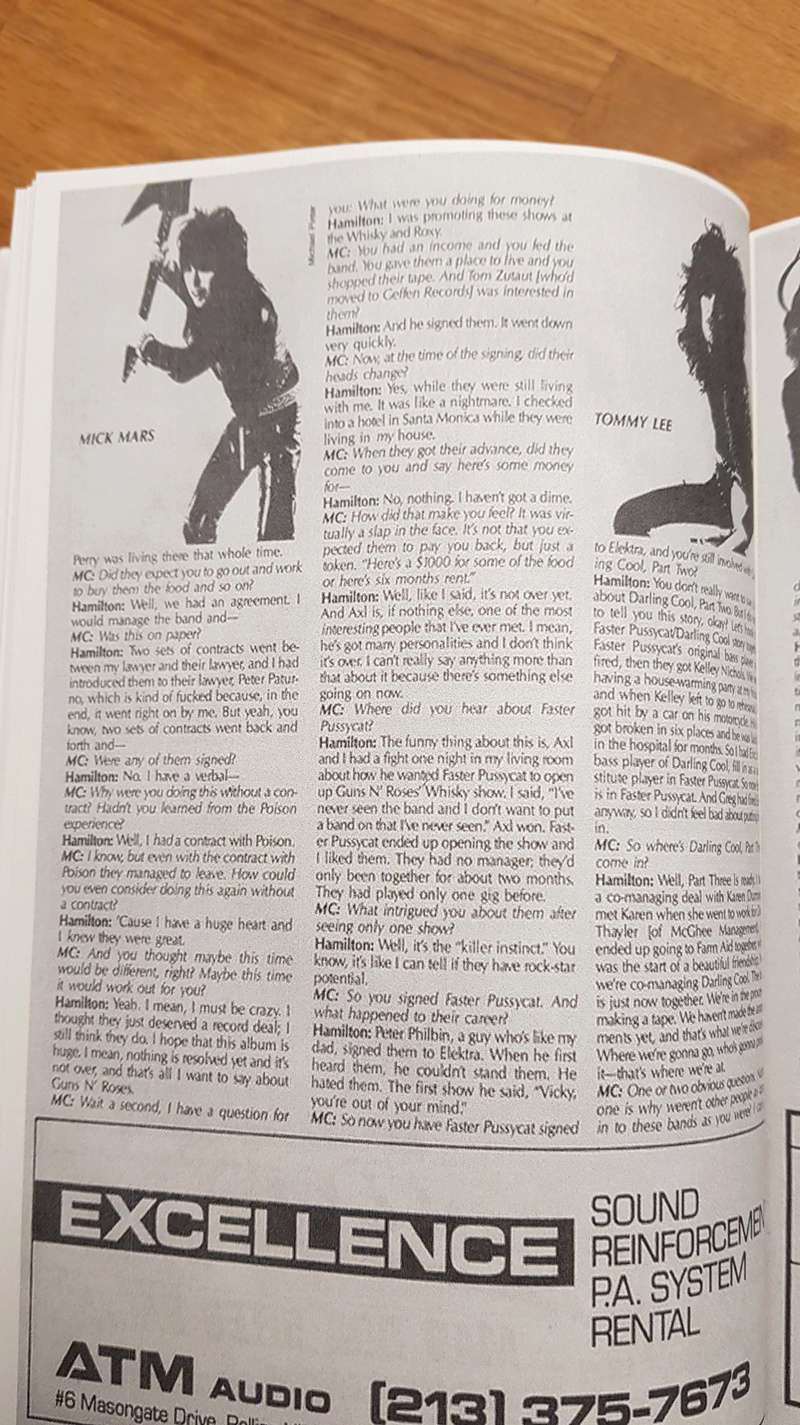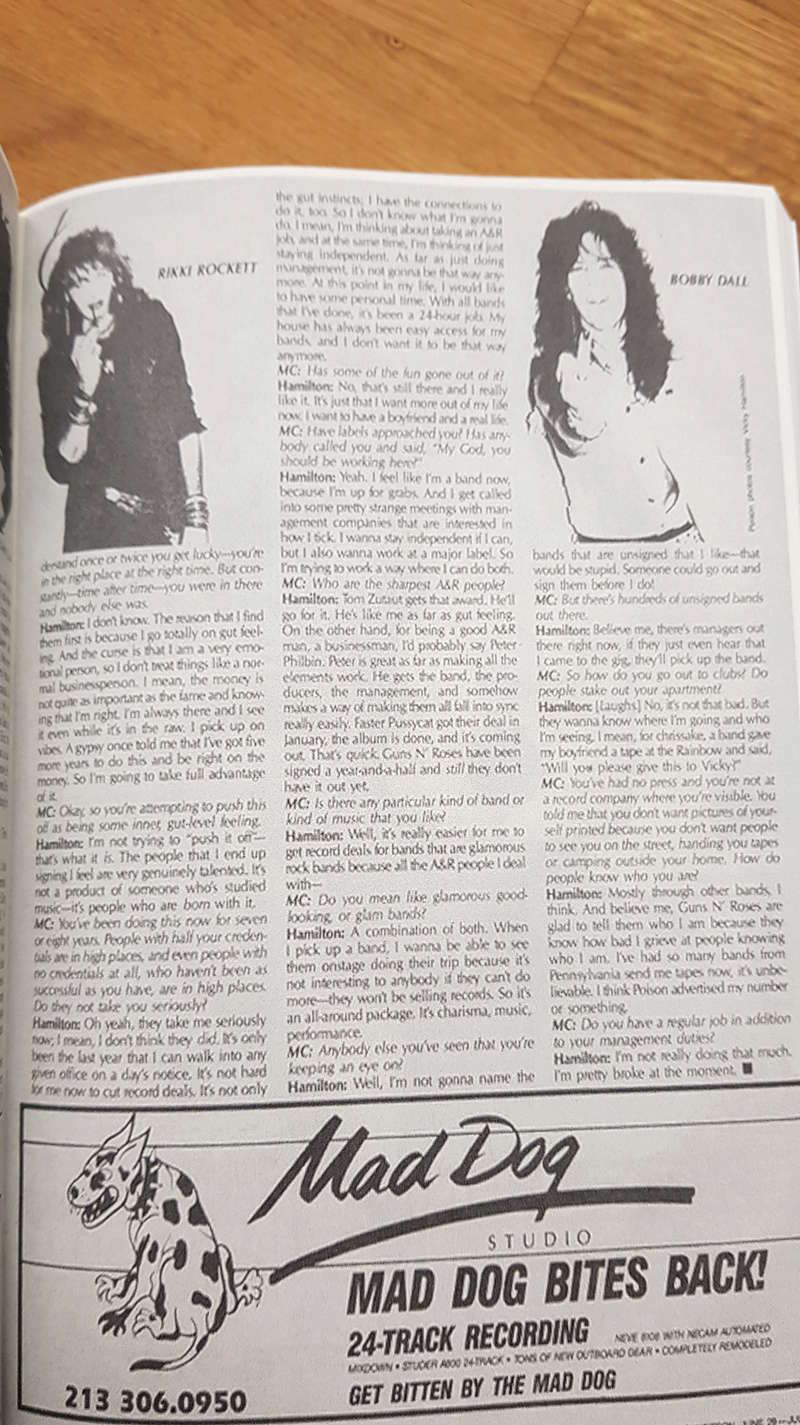1987.06.DD - Music Connection - The Ears of Vicky Hamilton
Page 1 of 1
 1987.06.DD - Music Connection - The Ears of Vicky Hamilton
1987.06.DD - Music Connection - The Ears of Vicky Hamilton




----------------------
TRANSCRIPTION:
----------------------
THE EARS OF VICKY HAMILTON
Some say the best in L.A.
VICKY HAMILTON: THE BEST EARS IN HOLLYWOOD
In one way or another, 29-year-old Vicky Hamilton has figured prominently in the signings and successes of Motley Crue, Stryper, Poison, Guns N’ Roses, and Faster Pussycat. She combines the knowledge of a street-wise A&R person with the warmth and charm of a den mother in nurturing her bands to the top. She’ll take them in, feed them, clothe them, praise them, and inspire them. An in return, they usually mumble, “Thanks,” as they walk away in search of big breaks behind the closed doors of so-called “professional” managers.
In a less absurd world, Hamilton would be heading up some label’s A&R department; instead, she’s struggling to make ends meet. How many more bands must she discover before the industry-at-large takes her seriously?
Refusing to be photographed for fear of losing what remains of her private life, Vicky Hamilton moves on – in search of the Next Big Thing. And ya know what? She’s gonna find it, too!
By Kenny Kemer
MC: So how did you get into music?
Hamilton: Well, it goes back to Indiana. I grew up in Fort Wayne, and I managed a record store there. I also wrote for three different free presses, and I managed two bands. So I did that for a couple of years, and then I ended up coming out to California because it was my intention to shop the two bands that I managed in Indiana. Well, both bands came out here to L.A. and then went back, but I stayed. I started working as a record buyer at Licorice Pizza. It was right across the street from the Whisky, and that’s how my relationship with Motley Crue started, ‘cause the lived on Clark Street and they used to come into my record store all the time. They used to beg me to come to their shows. I went to see their show, and it was great. They packed the Whisky. It wasn’t like no one knew about it. They’re very original, and Nikki Sixx, in my mind, is like some kind of creative god. There’s no one quite like that, out of all my years of experience. And Nikki introduced me to his [then] manager, Alan Coffman, so I worked for Alan, then for Motley Crue. I did all their merchandising around town – displays in all the different record stores, and introduced Alan to some people and I shopped their tapes and---
MC: Why were you shopping their tapes when they had a manager?
Hamilton: Because Alan wasn’t really – he was like a real estate guy. He didn’t really know much about the music business. He had a lot of money, and somehow he’s related to Mick Mars. I didn’t really manage the band; I worked for their manager. So it was a damn good learning experience. Motley Crue had taken off to such a degree in such a short time that it was phenomenal. That impressed me, because it was the first time it’d ever happened to me.
MC: Who was responsible for their success?
Hamilton: It wasn’t any one person. Tom Zutaut ended up signing them to Elekra, which was their first major deal; he was very instrumental in their early career.
MC: So you now had a taste of a band that had become successful, and you obviously wanted to pursue this kind of thing. Who was next?
Hamilton: Then I did Stryper. I went from one extreme to the other. Their mother was always very much involved, and they have an investor lady. And my religious beliefs are quite a bit different from Stryper’s so that’s why I’m out of that.
MC: So you had no chance for Motley Crue. And you really had no chance with Stryper because the mother was a problem. What happened next?
Hamilton: Well, after Stryper I picked up a little band from Pennsylvania called Poison. They’d only been in town for like two months at that time.
MC: You were still at the record store at the time?
Hamilton: No. After Motley Crue, I became an agent at th Silver Lining Booking Agency in town. And I booked Stryper, so that’s how I became involved in Stryper. And I educated their mother on how the business is done.
MC: So how did you hear about Poison?
Hamilton: I’m not exactly sure how it happened. There was a lady named Ann Burgharnt at A&M Records who used to call me about Poison while I was still booking Stryper. She called me and said I should check out this band Poison, and I put Poison on a Country Club show with Stryper, and that was the first time I saw them as far as shows go. No band in town can pull off what Poison does live. I mean, it just isn’t done right now.
MC: What did you do for Poison as their manager?
Hamilton: Well, I got ‘em all their shows and shopped their tapes to the record companies.
MC: And nobody bought it?
Hamilton: Well actually, yeah – we did a right-of-first-refusal deal at Atlantic Records, and when the demo came back, they passed. So I went to Wes Hein at Enigma Records, and consequently that’s where they were picked up.
MC: Did those guys live with you? Did you help support them?
Hamilton: Yeah, I raised a lot of money for them. You know, I kept the thing going. They were living off of Hollywood Boulevard, right by the Chinese Theatre; we used to hang out down there all the time. I could do a movie about how Poison lived in those days because it was really hilarious. But it was very systematic. It was like Bobby Dall always cooked the meals and the rest of them had dish duty.
MC: This is Poison before C.C. joined?
Hamilton: Yeah. This was with Matt Smith [Poison’s original guitarist]. Matt ended up quitting the band and going back to Pennsylvania ‘cause his girlfriend was pregnant. He was a brilliant guitar player.
MC: So why aren’t you managing them now?
Hamilton: Well, I really don’t know what to say about it. It’s just that, you know, people, their ideas change and there were certain things that they wanted that I didn’t think were right for them.
MC: For example.
Hamilton: For example? Well, they wanted to have – this was when Matt was quitting the band. They wanted to have C.C. in the band and I wanted Slash, who’s now with Guns N’ Roses. But it was a lot of different little things. Bret [Michaels] would cancel photo sessions that I had booked. I mean, all of a sudden the band thought that they were smarter than I was – which may or may not have been true. I’m not sure. I hold no animosity towards Poison. I get along with them great. Maybe it was better for them to go because it was very hard for me to keep them going financially. They were starting to draw, but they still needed a lot more money.
MC: Were these guys working during the day?
Hamilton: No. They were promoting, Poison is the promoting machine. They were pasting up posters all over town and they were hustling. I mean, girls – literally hundreds of girls – would call their apartment and say, “Yeah, we wanna come over,” and they would say, “If you don’t bring a bag of groceries, we’re not gonna let you in.”
MC: So now it’s 1984; Poison is gone and you’re looking for a new band. Do you go to clubs every single night? Do people send you tapes, or is there a buzz that you pick up on?
Hamilton: I get tapes, I go to shows, I have my ear to the ground.
MC: How did you get involved with Guns N’ Roses?
Hamilton: Oh, it was a weird thing. I was moving from the Valley to West Hollywood, and Axl (of Guns N’ Roses) needed a place to live. Axl got rape charges pressed against him, so I was basically harboring a rape fugitive! But he got the rape charges dropped. I was trying to take care of Axl. And then Guns N’ Roses got kicked out of their studio because that’s where the rape charges went down. So, obviously, they could never go back there. So, all their stuff got moved into my one-bedroom apartment that I was already sharing with Jennifer Perry, who is a famous Los Angeles booking agent and manager. I mean, few people know that Jennifer Perry was living there that whole time.
MC: Did they expect you to go out and work to buy them the food and so on?
Hamilton: Well, we had an agreement. I would manage the band and---
MC: Was this on paper?
Hamilton: Two sets of contracts went between my lawyer and their lawyer, Peter Paterno, which is kind of fucked because, in the end, it went right on by me. But yeah, you know, two sets of contracts went back and forth and---
MC: Were any of them signed?
Hamilton: No. I have a verbal---
MC: Why were you doing this without a contract? Hadn’t you learned from the Poison experience?
Hamilton: Well, I had a contract with Poison.
MC: I know, but even with the contract with Poison they managed to leave. How could you even consider doing this again without a contract?
Hamilton: ‘Cause I have a huge heart and I knew they were great.
MC: And you thought maybe this time would be different, right? Maybe this time it would work out for you?
Hamilton: Yeah, I mean, I must be crazy. I thought they just deserved a record deal; I still think they do. I hope that this album is huge. I mean, nothing is resolved yet and it’s not over, and that’s all I want to say about Guns N’ Roses.
MC: Wait a second, I have a question for you: What were you doing for money?
Hamilton: I was promoting these shows at the Whisky and Roxy.
MC: You had an income and you fed the band. You gave them a place to live and you shopped their tape. And Tom Zutaut [who’d moved to Geffen Records] was interested in them?
Hamilton: And he signed them. It went down very quickly.
MC: Now, at the time of the signing, did their heads change?
Hamilton: Yes, while they were still living with me. It was like a nightmare. I checked into a hotel in Santa Monica while they were living in my house.
MC: When they got their advance, did they come to you and say here’s some money for---
Hamilton: No, nothing. I haven’t got a dime.
MC: How did that make you feel? It was virtually a slap in the face. It’s not that you expected them to pay you back, but just a token. “Here’s a $1000 for some of the food or here’s six months rent.”
Hamilton: Well, like I said, it’s not over yet. And Axl is, if nothing else, one of the most interesting people that I’ve ever met. I mean, he’s got many personalities and I don’t think it’s over. I can’t really say anything more than that about it because there’s something else going on now.
MC: Where did you hear about Faster Pussycat?
Hamilton: The funny thing about this is, Axl and I had a fight one night in my living room about how he wanted Faster Pussycat to open up Guns N’ Roses’ Whisky show. I said, “I’ve never seen the band and I don’t want to put a band on that I’ve never seen.” Axl won. Faster Pussycat ended up opening the show and I liked them. They had no manager; they’d only been together for about two months. They had played only one gig before.
MC: What intrigued you about them after seeing only one show?
Hamilton: Well, it’s the “killer instinct.” You know, it’s like I can tell if they have rock-star potential.
MC: So you signed Faster Pussycat. And what happened to their career?
Hamilton: Peter Philbin, a guy who’s like my dad, signed them to Elektra. When he first heard them, he couldn’t stand them. He hated them. The first show he said, “Vicky, you’re out of your mind.”
MC: So now you have Faster Pussycat signed to Elektra, and you’re still involved with Darling Cool, Part Two?
Hamilton: You don’t really want to say a lot about Darling Cool, Part Two. But I do want to tell you this story, okay? Let’s hook the Faster Pussycat/Darling Cool story together. Faster Pussycat’s original bass player was fired, then they got Kelley Nichols. We were having a house-warming party at my house, and when Kelley left to go to rehearsal, he got hit by a car on his motorcycle. His leg got broken in six places and he was laid up in the hospital for months. So I had Eric, the bass player of Darling Cool, fill in as a substitute player in Faster Pussycat. So now Eric is in Faster Pussycat. And Greg had fired Eric, anyway, so I didn’t feel bad about putting him in.
MC: So where’s Darling Cool, Part Three, come in?
Hamilton: Well, Part Three is ready. I have a co-managing deal with Karen Dumont. I met Karen when she went to work for Doug Thayler [of McGhee Management]. We ended up going to Farm Aid together, which was the start of a beautiful friendship. Now we’re co-managing Darling Cool. The band is just now together. We’re in the process of making a tape. We haven’t made the arrangements yet, and that’s what we’re discussing. Where we’re gonna go, who’s gonna produce it – that’s where we’re at.
MC: One or two obvious questions. Number one is why weren’t other people as tuned-in to these bands as you were? I can understand one or twice you get lucky – you’re in the right place at the right time. But constantly – time after time – you were in there and nobody else was.
Hamilton: I don’t know. The reason that I find the first is because I go totally on gut feeling. And the curse is that I am a very emotional person, so I don’t treat things like a normal businessperson. I mean, the money is not quite as important as the fame and knowing that I’m right, I’m always there and I see it even while it’s in the raw. I pick up on vibes. A gypsy once told me that I’ve got five more years to do this and be right on the money. So I’m going to take full advantage of it.
MC: Okay, so you’re attempting to push this off as being some inner, self-level feeling.
Hamilton: I’m not trying to “push it off” – that’s what it is. The people that I end up signing I feel are very genuinely talented. It’s not a product of someone who’s studied music – it’s people who are born with it.
MC: You’ve been doing this now for seven or eight years. People with half your credentials are in high places, and even people with no credentials at all, who haven’t been as successful as you have, are in high places. Do they not take you seriously?
Hamilton: Oh yeah, they take me seriously now; I mean, I don’t think they did. It’s only been the last year that I can walk into any given office on a day’s notice. It’s not hard for me now to cut record deals. It’s not only the gut instincts; I have the connections to do it, too. So I don’t know what I’m gonna do. I mean, I’m thinking about taking an A&R job, and at the same time, I’m thinking of just staying independent. As far as just doing management, it’s not gonna be that way anymore. At this point in my life, I would like to have some personal time. With all bands that I’ve done, it’s been a 24-hour job. My house has always been easy access for my bands, I don’t want it to be that way anymore.
MC: Has some of the fun gone out of it?
Hamilton: No, that’s still there and I really like it. It’s just that I want more out of my life now. I want to have a boyfriend and a real life.
MC: Have labels approached you? Has anybody called you and said, “My God, you should be working here?”
Hamilton: Yeah. I feel like I’m a band now, because I’m up for grabs. And I get called into some pretty strange meetings with management companies that are interested in how I tick. I wanna stay independent if I can, but I also wanna work at a major label. So I’m trying to work a way where I can do both.
MC: Who are the sharpest A&R people?
Hamilton: Tom Zutaut gets that award. He’ll go for it. He’s like me as far as gut feeling. On the other hand, for being a good A&R man, a businessman, I’d probably say Peter Philbin. Peter is great as far as making all the elements work. He gets the band, the producers, the management and somehow makes a way of making them all fall into sync really easily. Faster Pussycat got their deal in January, the album is done, and it’s coming out. That’s quick. Guns N’ Roses have been signed a year-and-a-half and still they don’t have it out yet.
MC: Is there any particular kind of band of kind of music that you like?
Hamilton: Well, it’s really easier for me to get record deals for bands that are glamorous rock bands because all the A&R people I deal with---
MC: Do you mean like glamorous good-looking or glam bands?
Hamilton: A combination of both. When I pick up a band, I wanna be able to see them onstage doing their trip because it’s not interesting to anybody if they can’t do more – they won’t be selling records. So it’s an all-around package. It’s charisma, music, performance.
MC: Anybody else you’ve seen that you’re keeping an eye on?
Hamilton: Well, I’m not gonna name the bands that are unsigned that I like – that would be stupid. Someone could go out and sign them before I do!
MC: But there’s hundreds of unsigned bands out there.
Hamilton: Believe me, there’s managers out there right ow, if they just even hear that I came to the gig, they’ll pick up the band.
MC: So how do you go out to clubs? Do people stake out your apartment?
Hamilton: [Laughs] No, it’s not that bad. But they wanna know where I’m going and who I’m seeing. I mean, for chrissake, a band gave my boyfriend a tape at the Rainbow and said, “Will you please give this to Vicky?”
MC: You’ve had no press and you’re not at a record company where you’re visible. You told me that you don’t want pictures of yourself printed because you don’t want people to see you on the street, handing you tapes or camping outside your home. How do people know who you are?
Hamilton: Mostly through other bands, I think. And believe me, Guns N’ Roses are glad to tell them who I am because they know how bad I grieve at people knowing who I am. I’ve had so many bands for Pennsylvania send me tapes now, it’s unbelievable. I think Poison advertised my number or something.
MC: Do you have a regular job in addition to your management duties?
Hamilton: I’m not really doing that much. I’m pretty broke at the moment.

Soulmonster- Band Lawyer
-

Posts : 15970
Plectra : 77381
Reputation : 830
Join date : 2010-07-06
 Similar topics
Similar topics» 1986.08.18 - Music Connection - Vicky Hamilton's letter
» 1986.08.04 - Music Connection - "Guns N' Roses vs Music Connection, The Sequel"
» 1987.11-12.DD - Music Connection - Tattooed Love Boys Take A Shot in the Dark (Axl, Slash, Duff, Izzy, Steven)
» 1986.03.05 - Letter from Tom Zutaut to Vicky Hamilton
» 2016.11.14 - Appetite For Distortion - Interview with Vicky Hamilton
» 1986.08.04 - Music Connection - "Guns N' Roses vs Music Connection, The Sequel"
» 1987.11-12.DD - Music Connection - Tattooed Love Boys Take A Shot in the Dark (Axl, Slash, Duff, Izzy, Steven)
» 1986.03.05 - Letter from Tom Zutaut to Vicky Hamilton
» 2016.11.14 - Appetite For Distortion - Interview with Vicky Hamilton
Page 1 of 1
Permissions in this forum:
You cannot reply to topics in this forum
